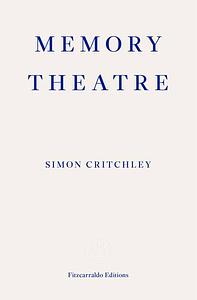You need to sign in or sign up before continuing.
Take a photo of a barcode or cover
As a story, a 2.
As a philosophy manifesto/introduction, a 4.
This is...barely a story, and that's okay. It's based mostly around the framework of going through someone's boxes following a death. It goes into a basic philosophical history before transitioning into a broader tale.
At such a small number of pages, it tries to balance it out well, but, honestly, I'd rather just read Crichley's philosophy works outright than a pamphlet-sized discussion wrapped in a fictional mask. Ideas don't always need this sort of packaging.
As a philosophy manifesto/introduction, a 4.
This is...barely a story, and that's okay. It's based mostly around the framework of going through someone's boxes following a death. It goes into a basic philosophical history before transitioning into a broader tale.
At such a small number of pages, it tries to balance it out well, but, honestly, I'd rather just read Crichley's philosophy works outright than a pamphlet-sized discussion wrapped in a fictional mask. Ideas don't always need this sort of packaging.
Intriguingly obscure in some of its references (a list of which is included at the back), this slim volume straddles memoir, fiction and philosophy. It feels like the start of a cracking story - if only there were more ...
Well the revelation for Critchley here–that life's totality is more than just the recounting of one's knowledge–wasn't all that revelatory to me personally by the end, but Memory Theatre is a cool little book that you can, and should, read in one sitting. The book, elaborate as it is, could easily be overwritten, overwrought or too long, but the author is careful to mix his Hegel and Plato with some humor and pop culture. And also outright narrative, which goes something like this: Critchley's philosopher-friend dies, he leaves Critchley some boxes. One of these boxes contains a prediction of Critchley's death using a unconventional astrological chart of the dead-philosopher friend's making. Critchley becomes obsessed with this chart, a blueprint for his own memory theatre, and attempts to make it a reality. When Critchley does get heady, it's in the service of the book and reader and that narrative, contextualizing this broader concept of the memory theatre that underpins the whole thing.
So it's entertaining. And smart. And also kinda creepy. A lot of fun and super short. I don't know, just try it out, you lil freak.
So it's entertaining. And smart. And also kinda creepy. A lot of fun and super short. I don't know, just try it out, you lil freak.
Tom McCarthy blurbs this book and if you like his work you'll like this book they're so similar and yet McCarthy's work makes me shiver and this one just makes me shudder if only slightly.
Irritating and pretentious. Also describes the demise of the dinosaurs as having taken place 15 million years ago, rather than 65 million. I wonder if Critchley's book on David Bowie thinks Bowie was born in 1998.
It's been almost a week since I finished this, and this book is making me re-evaluate how I'm rating books here. Memory Theatre was a quick read, sometimes beautiful-- but ultimately not a book that moved me or left any lasting impact. As a person I tend to feel strongly for or against something, and am rarely neutral, if I am it's usually because I dont know enough about a subject. This book, I guess, felt like a lukewarm shower. So changing it from 4 to 3 stars.


